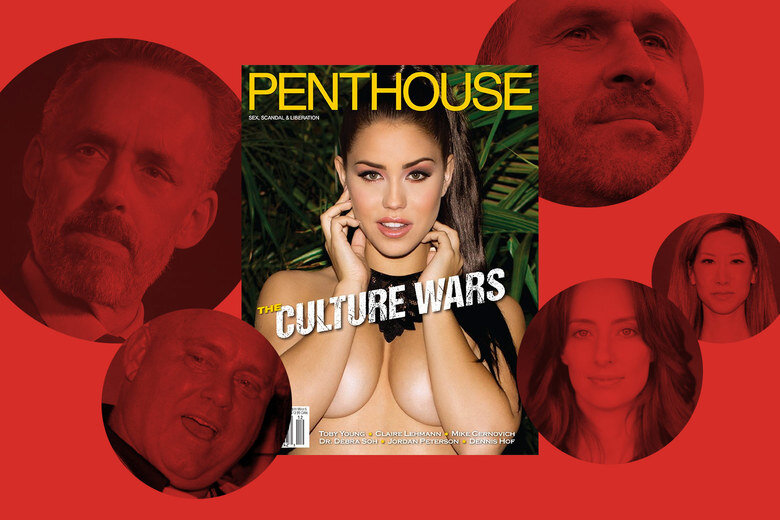A Penthouse Divided (Slate)
Read the full article by Rebecca Onion at Slate.com
Can a publication be both sexually provocative and a mouthpiece for the right? The iconic porn magazine seems to be trying.
On Wednesday, Nicole Cliffe—noted Twitter personality and Slate columnist—got the Penthouse treatment. The magazine’s official account tweeted an actually-quite-flattering caricature of Cliffe, with the message that she’d been put on something called #TheNewPuritansList for being “our favorite Mean Mommie” and siccing “mobs” on people. I gasped at the most bizarrely derogatory reference to motherhood I’d seen in a while; Cliffe seemed undisturbed, promptly making the caricature her Twitter avatar.
And Cliffe fans not accustomed to thinking of Penthouse at all suddenly wondered: Is the iconic 20th-century porn mag part of the intellectual dark web now? The answer, a qualified yes, is extremely instructive if you’re trying to understand how decades-old fights over feminism have morphed into undercurrents of the messy partisan politics of 2018.
Penthouse’s tagline in the 1990s was “sex, politics, and protest”; the 20th-century magazine’s editorial content is inevitably described as “pushing boundaries.” “The magazine infuriated feminists and conservatives, but others praised it for breaking taboos,” Robert D. McFadden writes (in an example of infuriating New York Times both sides–ism) in founder Bob Guccione’s 2010 obituary. And that founder explicitly thought of the magazine as a political project. “I think we made a very serious contribution to the liberalization of laws and attitudes,” Guccione said to Anthony Haden-Guest in New York magazine in 2004. “Much that has happened in the Western world with respect to sexual advances is directly due to steps that we took.”
Like its rival Playboy, 20th-century Penthouse had its ambitions to contribute to culture and political discourse. It published Philip Roth, Stephen King, Joyce Carol Oates, and Anne Rice, and interviewed Isaac Asimov. Anna Wintour worked as a fashion editor at Guccione’s Viva, a magazine for women that ran male nudes (though Wintour allegedly saw the job as beneath her and has tended to downplay that part of her biography). Guccione loved science and started Omni magazine, which was genuinely good. For a while in the late ’80s, he and his wife funded a group of 82 scientists working on cold fusion in San Diego.
Yet, always, there were the photographs of naked women—and some of the “boundaries” those photographs pushed earned critique from feminists.
Penthouse Media Group’s former CEO, Kelly Holland, arrived on the job in 2016 to some media fanfare, because of her gender and her self-proclaimed feminism.* Libby Copeland interviewed Holland that year for Esquire. Holland called herself a “born-again leftist” and proudly described a record of being an ally of women in the sex industry.
But in other instances, the magazine has given voice to a motley crew of people on the right. Alan Dershowitz—who also contributed to Penthouse back in the day, showing some continuity between past and present—wrote for the December 2016 issue on the topic “Does Porn Cause Harm?” (Guess his answer!) In September, the magazine profiled Blaire White, a trans YouTuber who supports Donald Trump.
The magazine seems to swing farthest right when it touches on gender politics directly. Penthouse columnist Leah McSweeney has published pieces critiquing the #MeToo movement using a combination of empty generalizations and reductionism. In a pair of essays, McSweeney mischaracterized the movement’s hashtag as #BelieveAllWomen (it’s #BelieveWomen, and that difference matters) and wrote that she doesn’t think that Asia Argento or Rose McGowan were really “raped” by Harvey Weinstein. Perhaps most disturbingly, Penthouse compiled and circulated a timeline of events of Asia Argento’s actions before Anthony Bourdain’s death, essentially accusing her of causing his suicide. “Toxic femininity exists. We can’t continue to deny that,” McSweeney wrote. For McSweeney, Argento and McGowan are #MeToo, and their personal failings condemn the entire movement. The many, many other revelations of male misconduct in multiple industries beyond Hollywood remain undiscussed.

